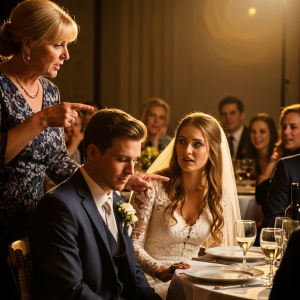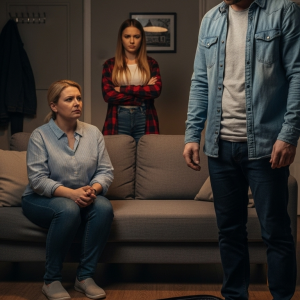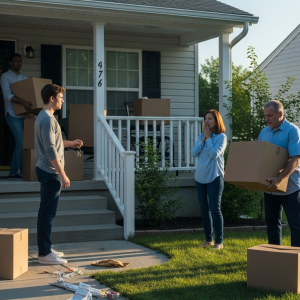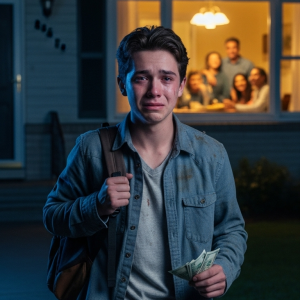My name is Lisa, I’m twenty-four, and my husband, Jack, is twenty-six. We met in college and have been married for three years. I never imagined I’d be posting our story online, but my world has shattered, and I have nowhere else to turn.
To understand how we ended up here, you need to understand us. I am a social butterfly; he is an introvert. I thrive in the energy of a crowd, while Jack finds peace in a quiet night with a book. He was always my biggest supporter, encouraging my social life even when it drained him. But I pushed him too far. I took his kindness for weakness, and now I am paying the price.
Jack was the kind of man who would do anything to make me happy. He’d wake up early to bring me my favorite coffee, cancel his plans if I felt down, and prioritize my needs above all else. He was attentive, kind, and so eager to please that, over time, I stopped seeing it as love and started seeing it as a given. I took it all for granted.
When I decided I wanted to be a stay-at-home wife, despite us not having children, he agreed without hesitation. He worked long hours at his demanding job, only to come home to a messy house and no dinner. He never complained. He’d just quietly start cooking or cleaning, shouldering my responsibilities on top of his own. Instead of feeling grateful, I felt a growing resentment. I saw his accommodation not as strength, but as a lack of a backbone. I craved a man who would challenge me, not one who yielded to my every whim.
I started spending more time with my friends, especially Tina. They were fun and carefree, and they reinforced my worst thoughts. “You deserve someone who can keep up with you, Lisa,” Tina would say, fanning the flames of my dissatisfaction. I began mocking Jack behind his back, turning his quiet kindness into a punchline.
The more I pulled away, the harder Jack tried to hold on. He’d surprise me with gifts and plan romantic dinners, but I had already checked out emotionally. I started flirting with other men, basking in the attention. Jack noticed. I could see the flicker of pain in his eyes, but he never confronted me. He just tried harder, believing his love alone could fix the chasm growing between us.
My disrespect became a virus that infected our social circle. My friends followed my lead, treating Jack with a casual disdain. They’d joke about him being “whipped,” and he, ever the peacemaker, would force a laugh, saying he was just glad I was happy. I was too wrapped up in my own ego to see I wasn’t just hurting him; I was systematically dismantling his self-worth in front of everyone we knew.
The breaking point began to build a week before the fateful neighborhood party. At a barbecue, surrounded by friends, the conversation turned to relationships. I started bragging, fueled by wine and a need to perform. I told everyone how Jack did everything for me, how he catered to my every need. My friends started laughing, making the usual jokes.
“Seriously, Lisa, you have him so well-trained!” Tina chimed in.
I saw Jack standing by the grill, listening. For a split second, a wave of shame washed over me. But the desire to be the center of attention was stronger. I laughed along, adding more jokes at his expense. That night, when we got home, Jack didn’t say a word. He just went to bed, leaving me alone with a toxic cocktail of anger and regret. I foolishly told myself it would blow over. It always did. I had no idea the final straw was about to break.
The neighborhood party was a regular event in our close-knit community. It was supposed to be a night of relaxation and fun. For me, it was the night my life ended.
Jack was at the grill, as usual, being his helpful self. I was with my friends, a few drinks in, feeling bold. The conversation, inevitably, turned to our husbands.
“You are so lucky, Lisa,” one friend said. “My husband wouldn’t lift a finger.”
Feeling tipsy and reckless, I laughed. “Lucky? I’ve just perfected the art of husband management. Jack never says no. Honestly, the man doesn’t have a backbone.”
The group erupted in laughter. The teasing escalated, with my friends making jokes about how whipped he was. I was soaking it in when a sudden silence fell over our table.
I turned. Jack was standing there.
He wasn’t angry. He wasn’t sad. He was just… empty. The usual warmth in his eyes was gone, replaced by something flat and hollow, like a house with all the lights turned off. He had heard everything.
He walked over to our table, his steps deliberate. The party’s cheerful noise seemed to fade into a distant hum. He looked directly at me, his gaze cutting through my drunken haze.
“We need to talk,” he said, his voice eerily calm.
Surprised, I followed him away from the prying eyes. But as soon as we were out of earshot, he stopped and faced me.
“It’s over, Lisa.”
I laughed, thinking it was a joke. But his face was a mask of stone.
“I’m done,” he said, the words precise and final. “I am tired of being your joke. I am tired of being disrespected. I’m leaving. You will not be coming back to the house. Your things will be on the porch.”
And with that, he turned and walked away, back through the party, without a second glance.
I stood there, frozen, the blood draining from my face. I could feel every eye on me, their expressions a mixture of pity and shock. I hurried after him, but by the time I reached our house, he was already inside, methodically packing my belongings into boxes.
I begged. I cried. I pleaded. I tried every manipulation that had ever worked before. It was like talking to a stranger. He wouldn’t look at me. He just kept packing, his movements efficient and resolute. When he was finished, he carried the boxes to the front door and placed them on the porch.
“Leave,” he said, his voice flat.
When I refused, still crying on the doorstep, he took out his phone. “If you are not gone in five minutes, I am calling the police.”
The threat was real. Defeated, I gathered what I could. As I stumbled down the driveway, I could see the silhouettes of my neighbors and my so-called friends. None of them moved to help. They just watched. In that moment, I had never felt so alone. I ended up at a nearby park and called my dad, who came and took me home, his disappointment a heavy blanket in the car.
The days that followed were a blur of confusion and desperate attempts to contact Jack. He blocked my calls and ignored my texts. My “friends,” including Tina, vanished. Not a single call to see if I was okay. It became brutally clear they were never my friends; they were just an audience for my cruelty. I blocked all of them.
I’ve been living with my parents, lost and unemployed. For a while, I clung to a foolish hope. “He’ll regret this,” I told myself. “He’ll miss me and come back.”
He didn’t. When we finally spoke through lawyers, his message was simple: he wanted a divorce.
The divorce itself was straightforward. The house was his from before our marriage. Since I was unemployed, I received a small amount of alimony, but it wasn’t much. The life I knew was officially over.
The hardest part is the knowledge that he is happier without me. A neighbor, someone Tina had always disliked, ran into me recently. She was surprisingly kind. She told me the gossip. Jack seems peaceful, focused on his work, and completely uninterested in dating—especially not any of my former friends, who, in a twist of bitter irony, are now all trying to get his attention. The very people who helped me tear him down are now scrambling for the affection of the man they mocked.
The conversation with that neighbor was a wake-up-call. There are still good people out there. I was just too blind to see them.
My dad helped me get a low-paying job that I hate, but it’s a start. I’ve been saving what I can, hoping to one day move out of my parents’ house. I’ve started therapy. It’s a painful process, forcing me to confront the insecurity and cruelty that drove me to push away the one person who loved me unconditionally.
This is my last update. I know I messed up. I live with that knowledge every single day. Seeing Jack thrive without me is a constant, stinging reminder of my failure. There is no easy fix, no magic wand to take it all back. There is only the long, hard road of rebuilding a life from the ruins I created. I am learning, one day at a time, to live with the consequences of my own actions.
The weeks after Jack threw me out were the darkest I’ve ever known.
When I woke up in my childhood bedroom—same faded wallpaper, same creaky ceiling fan—it felt like my life had rewound ten years, except this time I wasn’t an innocent kid dreaming of the future. I was a grown woman sitting in the ruins of the future I’d already had… and destroyed.
I couldn’t eat. Food tasted like cardboard. My mom would leave toast and tea outside my room; I rarely touched them. My dad gave me space at first, but I could feel his silent judgment like a weight in the air. We weren’t a family that yelled, but disappointment… disappointment is quieter, and it cuts deeper.
The few people who did reach out weren’t the ones I expected. It wasn’t Tina. It wasn’t my “girls’ night” crew. In fact, it was almost laughable—most of them had gone radio-silent within twenty-four hours of Jack kicking me out.
I remember lying on my bed scrolling through my phone, staring at their names in my contact list, thinking: They weren’t my friends. They were my audience. And without Jack to make fun of, I wasn’t worth watching anymore.
My dad was the one who suggested therapy. At first I resisted.
“I’m fine,” I told him, even though I wasn’t.
“You’re not fine,” he replied bluntly. “You’ve been wearing the same sweatshirt for three days, Lisa.”
So I went.
Walking into that beige little office was humiliating. I sat on the couch, arms crossed, waiting for the therapist to tell me what I already knew: that I’d been a terrible wife. But she didn’t start with blame. She started with, “Tell me what you miss.”
The first thing that came out of my mouth wasn’t Jack. It wasn’t my house. It wasn’t my old lifestyle.
“I miss… liking myself.”
And there it was—the truth I’d been avoiding. I had destroyed my marriage, yes, but I’d also been destroying myself for years before that. Every cruel joke, every eye-roll, every time I chose attention over kindness… it was all chipping away at me too.
About a month after the party, I ran into Emily—one of the nicer neighbors, the kind Jack used to help shovel snow for without being asked. She stopped me outside the grocery store.
“Lisa, I heard about you and Jack… I’m sorry.”
I braced for pity, but her tone wasn’t smug or judgmental. She told me Jack was doing well—throwing himself into work, spending weekends fixing up the house, and volunteering at the local animal shelter.
Then she said something that stuck: “He seems… lighter.”
It was like someone had punched me in the chest. Lighter. As in, without me, life was easier. I nodded and mumbled something polite, but inside, the words kept echoing.
I tried, for a while, to get through to him.
One last email. One last handwritten letter.
The letter came back in my mailbox with Return to Sender stamped in red.
That was the moment I knew there would be no reconciliation. He wasn’t angry anymore. He wasn’t even sad. He had simply closed the door on me.
And maybe that was worse—because anger means there’s still something there. Silence is final.
It was my brother who told me the final nail in the coffin of my old social life: Tina was openly pursuing Jack.
“She posts about it on Instagram like it’s some grand love story,” he said. “It’s gross.”
I didn’t even have the energy to be jealous. I just felt… embarrassed. Embarrassed that I had let someone like her influence me. Embarrassed that I had traded the stability of my marriage for the approval of people who would eat each other alive if it meant being in the spotlight.
Later, I heard from Emily that Jack had politely but firmly turned Tina down. “I don’t date my ex-wife’s friends,” he told her. That simple sentence—respectful, but absolute—made me ache in ways I can’t describe.
Therapy became my anchor.
Week after week, I unpacked my choices. The therapist didn’t let me wallow in self-pity, but she also didn’t let me hide behind excuses. We talked about the way I sought validation, how I confused dominance with strength, and how my need to “perform” socially came from a deep fear of being invisible.
I started working again—not a glamorous job, just part-time at a local café. At first, the thought of wiping tables and refilling coffee cups felt like rock bottom. But there’s something humbling about earning your own paycheck after you’ve spent years relying on someone else’s labor.
My first payday, I took my parents out to dinner. It wasn’t expensive, but the bill was mine to pay. My dad smiled—not the sad, tight smile from before, but something real.
A few months ago, there was another neighborhood party—the same annual one where everything had blown up the year before.
I thought about going. Maybe to show I was still part of the community. Maybe to prove I could hold my head high.
But then I imagined seeing Jack there, surrounded by people who now respected him more than ever, and I stayed home. Not because I was afraid… but because it wasn’t my place anymore. That chapter was closed.
Instead, I spent the evening reading. The me from a year ago would have mocked that as “boring.” The me now found it peaceful.
One night, while we were doing dishes, my mom said quietly, “You remind me more of yourself lately.”
I asked her what she meant.
“The version of you before… all this. Before you started performing for other people. Before you forgot that kindness isn’t weakness.”
Her words stung, but in a good way—like antiseptic on a wound. I knew she was right.
I don’t think I’ll ever “get over” what happened. Not in the sense of forgetting it. But I’m learning to live with it, to let it be a scar that reminds me who I refuse to be again.
I’ve cut all ties with Tina and anyone who egged me on back then. My circle is smaller now, but it’s made of people who don’t require me to put others down to belong.
Jack and I will probably never speak again. That’s a reality I’m learning to accept. I hope, in some quiet way, he knows that I finally understand. That I’m sorry—not the kind of sorry that’s meant to win someone back, but the kind that just… is.
Life is different now. Simpler. I get up, I work, I save. I’m looking at small apartments I might afford next year. My parents are cautiously proud. I am cautiously proud.
And maybe that’s the point.
Sometimes the most painful endings aren’t there to teach you how to win someone back. They’re there to teach you how to become someone worth keeping in the first place.




